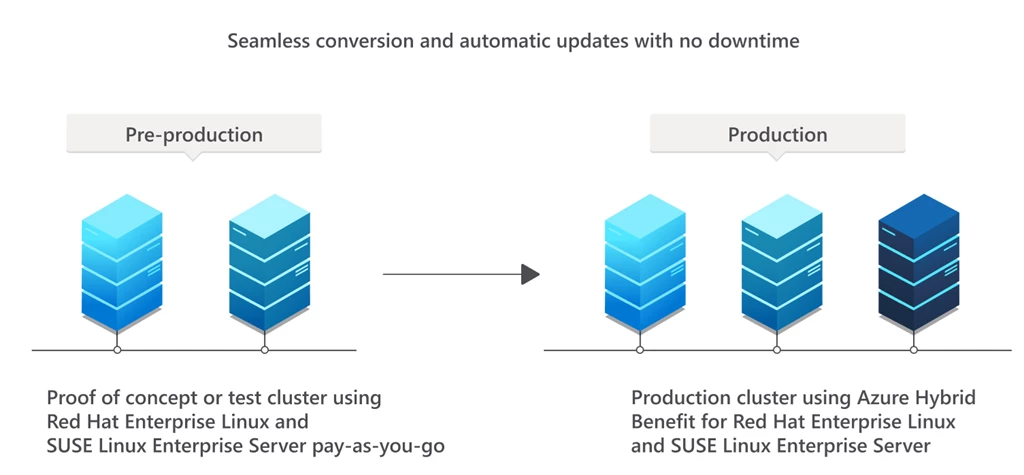Coinciding with this week’s Kubecon and Open Azure Day virtual events, today we’re announcing the general availability of Azure Hybrid Benefit functionality for Linux customers, allowing you to bring both your on-premises Windows Server and SQL Server licenses, as well as Red Hat Enterprise Linux (RHEL) or SUSE Linux Enterprise Server (SLES) subscriptions to Azure.
During the preview period, over 1,500 Linux virtual machines have already been migrated to Azure using the new Azure Hybrid Benefit capabilities, helping to significantly reduce the costs of running enterprise Linux workloads in Azure.
While previous Bring-Your-Own-Subscription cloud migration options available to Red Hat and SUSE customers allowed them to use their pre-existing RHEL and SLES subscriptions in the cloud, Azure Hybrid Benefit improves upon this with several capabilities that are unique to Azure and makes enterprise Linux cloud migration even easier than before:
- Applies to all Red Hat Enterprise Linux and SUSE Linux Enterprise Server pay-as-you-go images available in the Azure Marketplace or Azure Portal. You don’t need to provide your own image.
- Save time with seamless post-deployment conversions—there’s no need for production redeployment. You can simply convert the pay-as-you-go images you used during your proof of concept testing to bring-your-own-subscription billing.

- Lower your ongoing operational costs with automatic image maintenance, updates, and patches—Microsoft maintains the converted RHEL and SLES images for you.
- Enjoy the convenience of unified user interface integration with the Azure CLI, providing the same UI as other Azure virtual machines, as well as scalable batch conversions.
- Get co-located technical support from Azure, Red Hat, and SUSE with just one ticket.
- Combine with recently announced Red Hat and SUSE support for Azure shared disks to lift-and-shift failover clusters and parallel file systems—like Global File System.
- Fully compatible with Azure Arc, providing end-to-end hybrid cloud operations management for your Windows, RHEL, and SLES servers in one solution.
“We’re pleased to have worked closely with Microsoft to bring Red Hat Enterprise Linux to Azure Hybrid Benefit,” said Gunnar Hellekson, senior director, Product Management, Red Hat Enterprise Linux at Red Hat. “Giving customers more, and easier, choices as to where and how they run the world’s leading enterprise Linux platform and the foundation for our hybrid cloud portfolio is especially beneficial today, as organizations evolve digital transformation initiatives in response to dynamic global conditions.”
“Azure Hybrid Benefit for SUSE Linux Enterprise Server will give our joint customers improved flexibility and ease of use when running SUSE Linux on Azure,” said Rachel Cassidy, SVP Global Channel & Cloud at SUSE. “Whether used with mission-critical workloads like SAP on SUSE Linux, or high-performance computing, Azure Hybrid Benefit for SUSE Linux will help customers simplify, modernize and accelerate their infrastructure and make running SUSE Linux on Azure more cost-effective than ever.”
To see a demonstration of Azure Hybrid Benefit and how it works for Red Hat and SUSE, check out this video:
Learn more about Azure Hybrid Benefit. For additional information about how Azure Hybrid Benefit applies for Linux, you can read more here.

